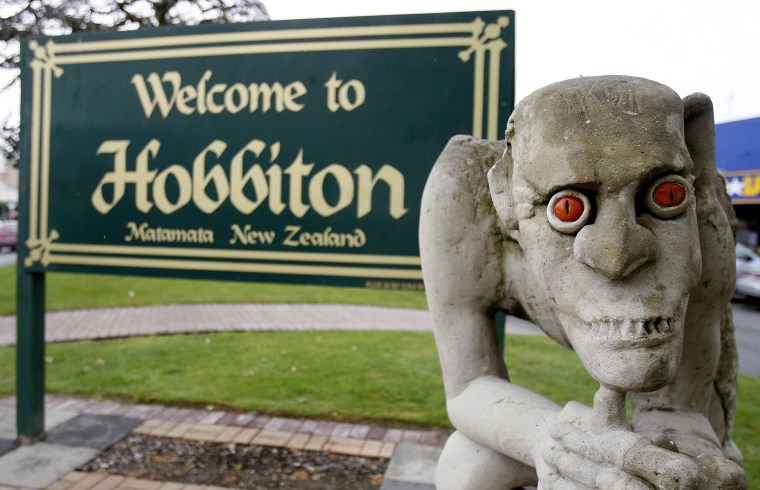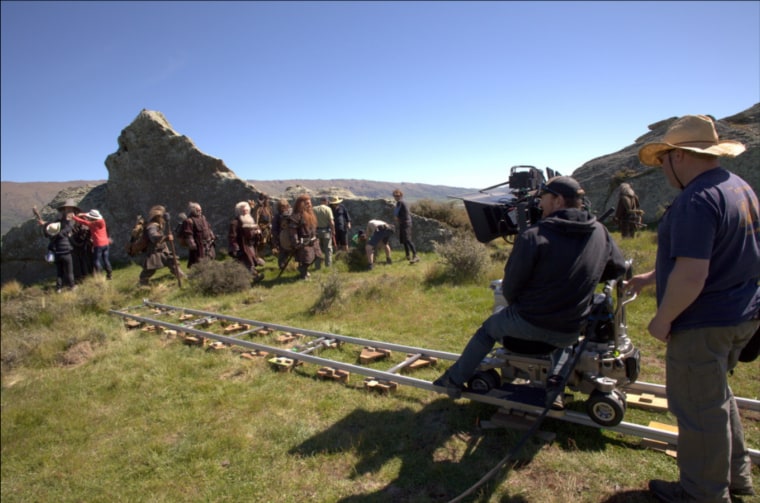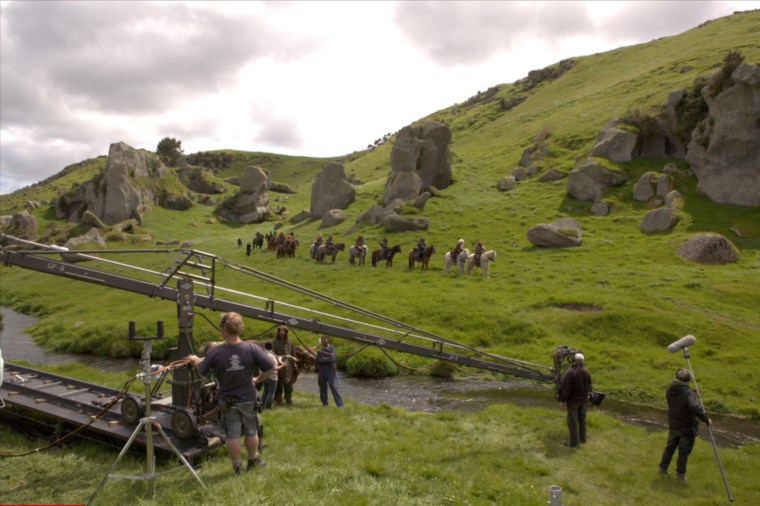Not long ago, the sounds of hundreds of armored feudal-era Chinese soldiers clashing swords rang out in the suburbs of Auckland, New Zealand.
In the midst of a pandemic that has hobbled film productions across the globe, that action sequence from the upcoming “Mulan” now seems like ancient history. It’s going to be a battle of a different kind to make movies before a COVID-19 vaccine is readily available.
“This will just be an interesting challenge to see how we actually are able to engage in the collaborative act of filmmaking,” said David Conley, executive visual effects producer at Weta Digital, the New Zealand-based effects house behind “The Lord of the Rings,” "Planet of the Apes" and “Avatar” franchises. “How many takes are you allowed to do of two actors hugging, for example?”
Instead of recruiting hundreds of extras for those big battles, perhaps the director can get by with 10 and add the rest of the legion courtesy of an army of computer programmers working remotely.
“We're not suggesting that this is a long-term solution, but it’s a short-term solution that helps those filmmakers who are eager to get their movies up and running again,“ Conley said.
The New Zealand government, which aggressively contained the coronavirus outbreak, has announced that domestic film productions can start rolling cameras again, with international productions, including James Cameron's "Avatar" sequels, to follow.
Studio executives and producers across the Pacific are eyeing the island nation as a potential savior, especially with so many other filming locations — including North American hubs California, New York and Georgia — grappling to find a safe path to reopen. The Los Angeles County Public Health Department is planning to allow film, TV and sound production to reopen "with modifications" in stage three of its recovery plan, which is weeks away at best and subject to change in the event of a coronavirus resurgence.
Full coverage of the coronavirus outbreak
Even in the best scenario, the pipeline that ultimately brings superhero flicks and other tentpole epics to the big screen has largely ground to a halt, which will ultimately cause a big gap in content in the coming years — even after movie theaters reopen.
Other countries have also announced the reopening of film productions within their borders, including mainland China and the Czech Republic. Deadline reported this week that the British government greenlighted the resumption of filming there, predicated on producers developing safety plans approved by health authorities for their sets.
None of those countries has been as successful in beating back the contagion as New Zealand, which reported no new cases of the virus for a third straight day on Thursday. And few have the cinematic infrastructure to handle multiple Hollywood epics at the same time, which has been in place in New Zealand since director Peter Jackson used the real-life Middle-earth for his "Lord of the Rings" movies. Film production is a $2 billion a year industry in the country of just under 5 million people.

"New Zealand has got a couple of advantages," said Ira Deutchman, a professor of film at Columbia University School of the Arts and a veteran independent film producer. "One is the fact that they jumped on (the coronavirus situation) much quicker than others did and managed to get it under control. And the fact that it is an island helps.
"But I think it's partially because New Zealand has an incredibly well-developed infrastructure for production that is not utilized tremendously by indigenous filmmakers," he continued. "So, they are better set up to handle outside production coming into the country."
Among the international productions that were halted when New Zealand shut down March 25 were the "Avatar" sequels, Amazon Studios' "Lord of the Rings" series, Netflix sci-fi series "Cowboy Bebop" and the Robert Downey Jr.-produced "Sweet Tooth."
With soundstages under construction in Christchurch, Dunedin and Queenstown on the South Island, the country could potentially absorb a few other movies that have been shut down elsewhere, said New Zealand Film Commission Chief Executive Annabelle Sheehan.
"They will have to be sure that they can provide a system that can keep both international guests, as it were, and the crew here and the rest of New Zealand safe," Sheehan said of movie and TV productions.
"We’ve done a lot of work on that. It won’t open in a way that’s unsafe," she said. "It's about balancing how many we can take in. We believe we have good capacity and some strong developing capacity."

With only 21 COVID-19 deaths recorded in the country, Prime Minister Jacinda Ardern's government has been lauded for its aggressive testing, quarantine policies and closing the country's borders to foreigners.
ScreenSafe, the official health and safety monitors of New Zealand's film industry, is developing protocols that productions will have to follow, including mandatory 14-day quarantines for actors, studio executives and department heads returning to the country.
Download the NBC News app for full coverage of the coronavirus outbreak
"There's a substantial set of documentation that is some 40 or 50 pages," Conley said. "As an example, hair and makeup will now have to operate in an extremely hygienic environment, in which they have to sort of distance actors or have actors come into a trailer at alternative times."
All involved acknowledge there's no script for how to make movies during a global pandemic.
"This is an important moment for film in New Zealand," Sheehan said, "and we kind of believe we’re ready."
